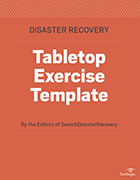tabletop exercise (TTX)
What is a tabletop exercise (TTX)?
A tabletop exercise (TTX) is a disaster preparedness activity that takes participants through a simulated disaster scenario.
A TTX is discussion-based and not only helps participants familiarize themselves with the emergency response process, but enables administrators to gauge the effectiveness of the organization's disaster recovery (DR) practices.
Typically, a facilitator guides participants through the exercise, taking them through a particular narrative and discussing what steps should be taken. Potential scenarios for tabletop exercises include natural disaster and pandemic responses, but these might differ depending on the location of the organization and nature of the industry. Participants can typically complete tabletop exercises over the course of a few hours.
What's the purpose of tabletop exercises?
The purpose of a tabletop exercise is to evaluate an organization's preparedness for a particular disaster and to inform required participants of their roles in the response. Whether it is destruction to facilities, loss of personnel or data loss from cyberattack, a tabletop exercise goes through every aspect of response.
While they use an accelerated timeline, tabletop exercises cover every aspect of the hypothetical scenario, from beginning to post-disaster efforts. They evaluate internal resources, lay out any external agencies the organization might call upon for assistance and identify which means of communication will be available at the time.
The outcome of a tabletop exercise can inform future DR planning and determine new guidelines the organization might need to implement. A TTX might identify gaps in personnel's knowledge or IT security flaws. Key personnel present during the exercise can not only become more comfortable with their own roles in disaster scenarios, but witness how the entire response will play out across the organization.
Following the exercise, participants and facilitators might compile an after-action report, detailing any key findings or questions highlighted during the exercise.
Tabletop exercise vs. other exercises
A tabletop exercise is one of seven types of exercises identified by the Homeland Security Exercise Evaluation Program for disaster preparation. These exercise types fall into two categories: discussion-based or operations-based.
Tabletop exercises are on the discussion-based list, along with seminars, workshops and games. While the other discussion-based exercises are similar to a TTX, a TTX is an interactive process used to assess plans, procedures and policies. Seminars and workshops might involve some interaction, but are primarily used to inform, and games are more informal than a TTX and do not replicate scenarios as closely.
Operations-based alternatives include drills, functional exercises and full-scale exercises. All are interactive, but unlike a TTX, these exercises typically include participants performing their duties, possibly on-site.
A drill is performed when one specific function or process can be tested, possibly in real time. A functional exercise goes a step further, with multiple participants performing their duties in a simulated environment. A functional exercise coordinates communications between the organization and any agencies it might need to rely on in a disaster scenario.
A full-scale exercise imitates the response as closely to the real situation as possible, engaging with emergency services and possibly even local businesses. Full-scale exercises entail responding in real time and on location.
Pros and cons
Testing is one of the most important aspects of disaster recovery and data protection. Tabletop exercises are a DR testing option that realistically prepares participants for disaster. They also inform the organization of any flaws or weaknesses in their disaster preparedness plan. A TTX is ideally an active discussion, where all participants contribute. This makes it a reliable way to see how much personnel know about their roles, and gives them an opportunity to ask questions they might not otherwise think to ask.
Because they can take place in informal settings, such as a classroom or conference room, tabletop exercises are a cost-effective way to evaluate and test incident response. While it does require a time investment from the participants and facilitators, the exercises are not performed in real time and can be completed over the course of hours rather than days.
The major disadvantage of a tabletop exercise is that it cannot replicate every aspect of a hypothetical situation. Thorough planning is paramount, and those creating the narrative for the exercise must consider all possible outcomes. Even then it is still a superficial review of the plan. Without experiencing these situations directly, some possibilities might be overlooked.
For example, an organization might prepare for a loss of access to its primary data center, but that scenario might not foresee a simultaneous loss of access to a cloud or offsite datacenter. While this is improbable, it is not impossible. In the interest of saving time or prioritizing more common disasters, organizations might overlook scenarios that seem unlikely. That oversight could leave them unprepared.
Several factors determine the types of scenarios an organization can plan for using a TTX. Common natural disasters vary by geography, as do geopolitical scenarios. The nature of the industry might also affect what disasters an organization needs to plan for.
Common scenarios include the following:
- Earthquake.
- Hurricane.
- Flood.
- Tornado.
- Loss of power.
- Fire.
- Pandemic.
- Cyberattack.
- Office/building emergency.
The type of emergency will determine the scope of the response, required personnel and inform the participants of their priorities and available resources. If it is a cyberattack, for example, the data protection team will have different action items than they would in the event of a natural disaster.








